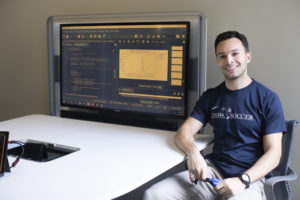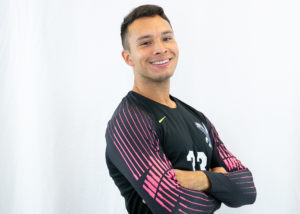Goalkeeper Steven DeVerteuil expects the unexpected on the soccer field. A startling score. A fortuitous save.
It’s what happened in the classroom that threw him off guard. A course he took to fulfill a University of Mary Washington liberal arts and sciences requirement peeled back the layers of a technology – and a world – he had taken for granted.

“It kept opening up my mind and pushing me in ways that I thought I could never be pushed,” DeVerteuil, a UMW senior, said of his major, a subject he discovered by chance. Now the first to pursue a Mary Washington partnership program in computer science and applications, he’s positioned to earn a master’s degree in less than two years and perhaps a career in the big leagues.
“I expect Steven will be very successful,” said Associate Professor of Computer Science Ian Finlayson, who was department chair when the program, part of Virginia’s Tech Talent Pipeline, was formed.
The “4+1 pathway” pairs foundational and dual-credit coursework, preparing UMW students for early admission to grad school. As many as six Mary Washington credits count also toward a degree from Virginia Tech’s College of Engineering.
Applicants submit résumés, references, transcripts and plenty of essays. DeVerteuil, who hails from Long Island, New York, spent weeks writing about his leadership experiences, academic and professional goals, and community service, including his work with Micah Ecumenical Ministries.
His first foray into the field of digital technology – UMW’s Introduction to Computer Science – had opened the gate to algorithms and abstractions, methods and modems, simulations and circuit designs … and a world of possibility spanning a college career and beyond.
“If you spend enough time breaking down a problem and building up a solution, you can create anything,” he said of a lesson he learned in Object Oriented Analysis and Design, a course encouraging collaboration. “When you add teammates to that, the sky is the limit.”

Artificial Intelligence pushed the boundaries beyond, exploring the science of robotics and how computers might think on their own. “It seemed like something out of a sci-fi movie,” said DeVerteuil, who plays tenor sax in the UMW Concert Band and is a member of Phi Beta Kappa and Chi Alpha Sigma.
His studies have worked their way into soccer, as well. He’s defining data sets, writing code and creating queries for an Honors Capstone project designed to unearth a better understanding of goalkeepers’ passing tendencies.
“For 21 years, I’d been looking at a computer and not really understanding what it was,” said DeVerteuil, who hopes to combine his passions, possibly working in major league sports after earning a master’s degree. “Now I can understand this thing that’s so integral to everyone’s lives.”